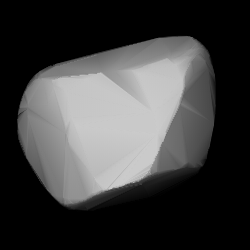246 Asporina
Appearance
 3D model based on lightcurve data | |
| Discovery | |
|---|---|
| Discovered by | A. Borrelly |
| Discovery date | 6 March 1885 |
| Designations | |
| (246) Asporina | |
Named after | Asporina |
| A885 EA | |
| Main belt | |
| Orbital characteristics[1] | |
| Epoch 31 July 2016 (JD 2457600.5) | |
| Uncertainty parameter 0 | |
| Observation arc | 130.96 yr (47834 d) |
| Aphelion | 2.98941 AU (447.209 Gm) |
| Perihelion | 2.39768 AU (358.688 Gm) |
| 2.69355 AU (402.949 Gm) | |
| Eccentricity | 0.10984 |
| 4.42 yr (1614.7 d) | |
Average orbital speed | 18.14 km/s |
| 172.414° | |
| 0° 13m 22.638s / day | |
| Inclination | 15.6259° |
| 162.347° | |
| 96.6218° | |
| Physical characteristics | |
| Dimensions | 60.10±4.2 km |
| 16.222 h (0.6759 d) | |
| 0.1744±0.027 | |
| R | |
| 8.62 | |
246 Asporina is a sizeable main-belt asteroid. It is classified as one of the few A-type asteroids.
It was discovered by A. Borrelly on 6 March 1885 in Marseilles and was named after Asporina, a goddess worshipped on Mount Asporenus, Asia Minor.[2]
The spectrum of 246 Asporina reveals the strong presence of the mineral olivine, a relative rarity in the asteroid belt.[3]
References
[edit]- ^ "246 Asporina". JPL Small-Body Database. NASA/Jet Propulsion Laboratory. Retrieved 12 May 2016.
- ^ Schmadel, Lutz (5 August 2003). Dictionary of Minor Planet Names. Springer Science & Business Media. ISBN 9783540002383 – via Google Books.
- ^ Burbine, T. H.; et al. (July 2000), "The Nature of Olivine Asteroids", Meteoritics & Planetary Science, vol. 35, pp. A35, Bibcode:2000M&PSA..35R..35B, doi:10.1111/j.1945-5100.2000.tb01796.x.
External links
[edit]- The Asteroid Orbital Elements Database
- Minor Planet Discovery Circumstances
- Asteroid Lightcurve Data File
- 246 Asporina at AstDyS-2, Asteroids—Dynamic Site
- 246 Asporina at the JPL Small-Body Database
